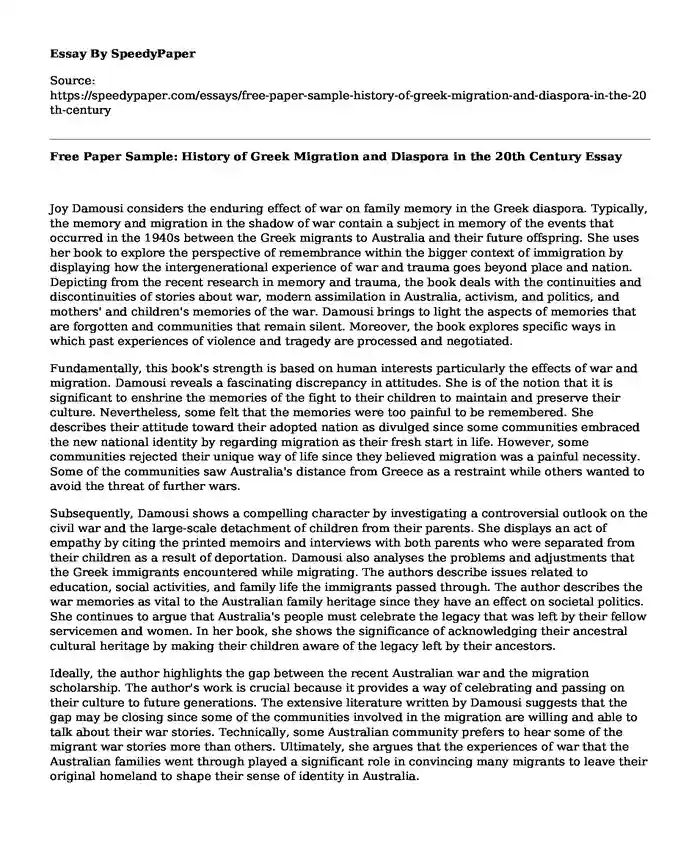
| Essay type: | Book review |
| Categories: | Culture Literature War Community |
| Pages: | 3 |
| Wordcount: | 821 words |
Joy Damousi considers the enduring effect of war on family memory in the Greek diaspora. Typically, the memory and migration in the shadow of war contain a subject in memory of the events that occurred in the 1940s between the Greek migrants to Australia and their future offspring. She uses her book to explore the perspective of remembrance within the bigger context of immigration by displaying how the intergenerational experience of war and trauma goes beyond place and nation. Depicting from the recent research in memory and trauma, the book deals with the continuities and discontinuities of stories about war, modern assimilation in Australia, activism, and politics, and mothers' and children's memories of the war. Damousi brings to light the aspects of memories that are forgotten and communities that remain silent. Moreover, the book explores specific ways in which past experiences of violence and tragedy are processed and negotiated.
Fundamentally, this book's strength is based on human interests particularly the effects of war and migration. Damousi reveals a fascinating discrepancy in attitudes. She is of the notion that it is significant to enshrine the memories of the fight to their children to maintain and preserve their culture. Nevertheless, some felt that the memories were too painful to be remembered. She describes their attitude toward their adopted nation as divulged since some communities embraced the new national identity by regarding migration as their fresh start in life. However, some communities rejected their unique way of life since they believed migration was a painful necessity. Some of the communities saw Australia's distance from Greece as a restraint while others wanted to avoid the threat of further wars.
Subsequently, Damousi shows a compelling character by investigating a controversial outlook on the civil war and the large-scale detachment of children from their parents. She displays an act of empathy by citing the printed memoirs and interviews with both parents who were separated from their children as a result of deportation. Damousi also analyses the problems and adjustments that the Greek immigrants encountered while migrating. The authors describe issues related to education, social activities, and family life the immigrants passed through. The author describes the war memories as vital to the Australian family heritage since they have an effect on societal politics. She continues to argue that Australia's people must celebrate the legacy that was left by their fellow servicemen and women. In her book, she shows the significance of acknowledging their ancestral cultural heritage by making their children aware of the legacy left by their ancestors.
Ideally, the author highlights the gap between the recent Australian war and the migration scholarship. The author's work is crucial because it provides a way of celebrating and passing on their culture to future generations. The extensive literature written by Damousi suggests that the gap may be closing since some of the communities involved in the migration are willing and able to talk about their war stories. Technically, some Australian community prefers to hear some of the migrant war stories more than others. Ultimately, she argues that the experiences of war that the Australian families went through played a significant role in convincing many migrants to leave their original homeland to shape their sense of identity in Australia.
The book also focuses on how the war affected the relationship between different cultures. Damousi explains how the relationship between cultures and generations changed when the communities crossed the national borders. Damousi highlights how the Australian cultural life has been understood with little reference to emotional experience. Furthermore, she points out the ways in which the grief that the communities endured had been politicized. The author clearly explains how grief made communities demand cultural and political recognition of their painful memories. She describes how these communities' history was fundamental to who they were as they tried to express a public language of grief to help them claim legality for their loss. Damousi characterizes Australian immigrants as largely non-contemplative people who, in most cases, like the thought of action and the future.
Additionally, the author also describes how the experience of war by the Australian immigrants profoundly shaped their family's memories. Joy Damousi continues to argue how Australian cultural life has been ignored and also how this has affected the communities in a negative type of way. She also narrates how the Second World War contributed to the communities enduring grief and depression among families.
Recent studies show how depression in the Greek community affected older adults and women because of their loss. Moreover, the migratory experience negatively affected some communities, while in others, the occurrence did not affect them severely. Lastly, the author also explains how traumatic experiences affected most families due to past waves of migration. Conversely, the Australian communities should preserve their culture by taking their immigration history into account if, by chance, a more complex story is to be written regarding their experiences in the second world war.
Cite this page
Free Paper Sample: History of Greek Migration and Diaspora in the 20th Century. (2024, Jan 05). Retrieved from https://speedypaper.net/essays/free-paper-sample-history-of-greek-migration-and-diaspora-in-the-20th-century
Request Removal
If you are the original author of this essay and no longer wish to have it published on the SpeedyPaper website, please click below to request its removal:
- Free Essay: Theme of Power in Othello by William Shakespeare
- Free Essay about Regentrification of Urban Communities in the US: Chicago
- Novel Review Essay Example: The Circle by Dave Eggers
- Paper Example on the Lesson Plan on Island of the Blue Dolphins Book
- Free Essay - Factors Affecting Internet Use in American Population
- Essay Sample on Job Oriented Approach
- Essay Sample. Joint Commission Survey
Popular categories




